Proposition 93 was a Californian ballot proposition that sought to amend the term limits law for the California state legislature. Voters rejected it on February 5, 2008.
| Elections in California |
|---|
 |
Proposition 93 was a Californian ballot proposition that sought to amend the term limits law for the California state legislature. Voters rejected it on February 5, 2008.
Between the passage of Proposition 140 in 1990 [1] and the passage of Proposition 28 in 2012, California allows a person to serve 6 years in the California State Assembly and 8 years in the California State Senate. Proposition 93 would have changed the term limit to 12 years in both houses combined. If passed, the measure would have been the first amendment to the term limits law since Proposition 140 in 1990.
The proposition would have reduced the total number of years a person could serve in the state legislature from 14 to 12 years, while allowing current members to serve 12 years in their current house regardless of prior service. [1] Consequently, some current members of the legislature would have been allowed to serve beyond the 14 years prescribed by current term limit laws. [2]
The later, successful, Proposition 28 in 2012 did not apply such an advantageous set of rules to the current legislators; it kept them on the old rules rather than giving them a new set of rules better than either the old or new rules.
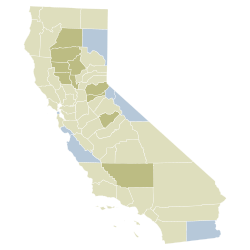
| Choice | Votes | % |
|---|---|---|
| | 4,574,826 | 53.59 |
| Yes | 3,961,466 | 46.41 |
| Valid votes | 8,536,292 | 94.13 |
| Invalid or blank votes | 532,123 | 5.87 |
| Total votes | 9,068,415 | 100.00 |

Proposition 13 is an amendment of the Constitution of California enacted during 1978, by means of the initiative process. The initiative was approved by California voters on June 6, 1978 by a nearly two to one margin. It was upheld as constitutional by the United States Supreme Court in the case of Nordlinger v. Hahn, 505 U.S. 1 (1992). Proposition 13 is embodied in Article XIII A of the Constitution of the State of California.

The California State Legislature is a bicameral state legislature consisting of a lower house, the California State Assembly, with 80 members; and an upper house, the California State Senate, with 40 members. Both houses of the Legislature convene at the California State Capitol in Sacramento. The California state legislature is one of just ten full-time state legislatures in the United States. The houses are distinguished by the colors of the carpet and trim of each house. The Senate is distinguished by the color red and the Assembly by the color green, inspired by the United Kingdom's House of Lords and House of Commons respectively.

In California, a ballot proposition is a referendum or an initiative measure that is submitted to the electorate for a direct decision or direct vote. If passed, it can alter one or more of the articles of the Constitution of California, one or more of the 29 California Codes, or another law in the California Statutes by clarifying current or adding statute(s) or removing current statute(s).
In the politics of the United States, the process of initiatives and referendums allow citizens of many U.S. states to place legislation on the ballot for a referendum or popular vote, either enacting new legislation, or voting down existing legislation. Citizens, or an organization, might start an initiative to gather a predetermined number of signatures to qualify the measure for the ballot. The measure is placed on the ballot for the referendum, or actual vote.

Don Richard Perata is a California lobbyist and former Democratic politician, who was President pro tempore of the California State Senate from 2004 to 2008. He came in second place in the November 2010 election for Mayor of Oakland.
Proposition 2½ is a Massachusetts statute that limits property tax assessments and, secondarily, automobile excise tax levies by Massachusetts municipalities. The name of the initiative refers to the 2.5% ceiling on total property taxes annually as well as the 2.5% limit on property tax increases. It was passed by ballot measure, specifically called an initiative petition within Massachusetts state law for any form of referendum voting, in 1980 and went into effect in 1982. The effort to enact the proposition was led by the anti-tax group Citizens for Limited Taxation. It is similar to other "tax revolt" measures passed around the same time in other parts of the United States. This particular proposition followed the movements of states such as California.
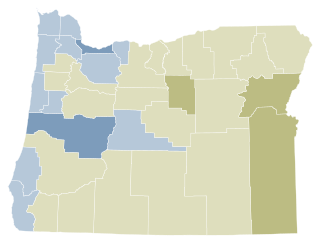
The Oregon Medical Marijuana Act, a law in the U.S. state of Oregon, was established by Oregon Ballot Measure 67 in 1998, passing with 54.6% support. It modified state law to allow the cultivation, possession, and use of marijuana by doctor recommendation for patients with certain medical conditions. The Act does not affect federal law, which still prohibits the cultivation and possession of marijuana.

Elections in California are held to fill various local, state and federal seats. In California, regular elections are held every even year ; however, some seats have terms of office that are longer than two years, so not every seat is on the ballot in every election. Special elections may be held to fill vacancies at other points in time. Recall elections can also be held. Additionally, statewide initiatives, legislative referrals and referendums may be on the ballot.

Proposition 218 is an adopted initiative constitutional amendment which revolutionized local and regional government finance and taxation in California. Named the "Right to Vote on Taxes Act," it was sponsored by the Howard Jarvis Taxpayers Association as a constitutional follow-up to the landmark property tax reduction initiative constitutional amendment, Proposition 13, approved in June 1978. Proposition 218 was approved and adopted by California voters during the November 5, 1996, statewide general election.

California's state elections were held November 3, 1992. Necessary primary elections were held on March 3. Up for election were all the seats of the State Assembly, 20 seats of the State Senate, and fifteen ballot measures.
Direct democracy refers to decision making or direct vote a proposal, law, or political issue by the electorate, rather than being voted on by representatives in a state or local legislature or council.

In California state elections, 2014 was the first year in which the top statewide offices were elected under the nonpartisan blanket primary, pursuant to Proposition 14, which passed with 53% voter approval in June 2010. Under this system, which first went into effect during the 2012 election year, all candidates appear on the same ballot, regardless of party. In the primary, voters may vote for any candidate, regardless of their party affiliation. The top two finishers, regardless of party, then advance to face each other in the general election in November.
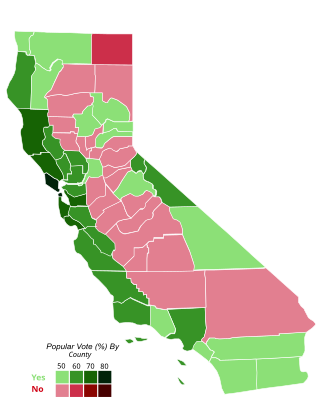
Proposition 47, also known by its ballot title Criminal Sentences. Misdemeanor Penalties. Initiative Statute, was a referendum passed by voters in the state of California on November 4, 2014. The measure was also referred to by its supporters as the Safe Neighborhoods and Schools Act. It recategorized some nonviolent offenses as misdemeanors, rather than felonies, as they had previously been categorized.

The California state elections in 2020 were held on Tuesday, November 3, 2020. Unlike previous election cycles, the primary elections were held on Super Tuesday, March 3, 2020.

California state elections in 2018 were held on Tuesday, November 6, 2018, with the primary elections being held on June 5, 2018. Voters elected one member to the United States Senate, 53 members to the United States House of Representatives, all eight state constitutional offices, all four members to the Board of Equalization, 20 members to the California State Senate, and all 80 members to the California State Assembly, among other elected offices.

California Proposition 69 was a legislatively referred constitutional amendment that appeared on ballots in California in the June primary election in 2018. This measure put the revenue from the Road Repair and Accountability Act, which increased fuel taxes, in a "lockbox" so that it can only be used for transportation-related purposes. It also exempts said gas tax revenue from the previously existing appropriations mandate and expenditures limit. This state constitution amendment ensures that revenues from SB1 Gas Taxes established by the Road Repair and Accountability Act of 2017 can only be used for transportation-related purposes.
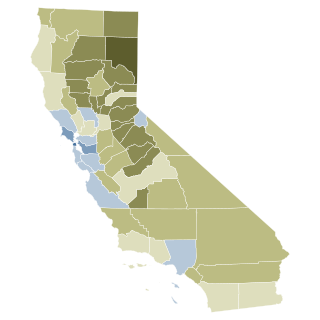
Proposition 13 was a failed California ballot proposition on the March 3, 2020, ballot that would have authorized the issuance of $15 billion in bonds to finance capital improvements for public and charter schools statewide. The proposition would have also raised the borrowing limit for some school districts and eliminated school impact fees for multifamily housing near transit stations.

Proposition 22 was a ballot initiative in California that became law after the November 2020 state election, passing with 59% of the vote and granting app-based transportation and delivery companies an exception to Assembly Bill 5 by classifying their drivers as "independent contractors", rather than "employees". The law exempts employers from providing the full suite of mandated employee benefits while instead giving drivers new protections:
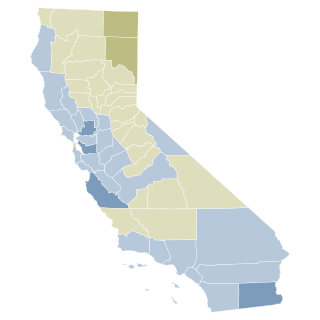
The California Privacy Rights Act of 2020 (CPRA), also known as Proposition 24, is a California ballot proposition that was approved by a majority of voters after appearing on the ballot for the general election on November 3, 2020. This proposition expands California's consumer privacy law and builds upon the California Consumer Privacy Act (CCPA) of 2018, which established a foundation for consumer privacy regulations.
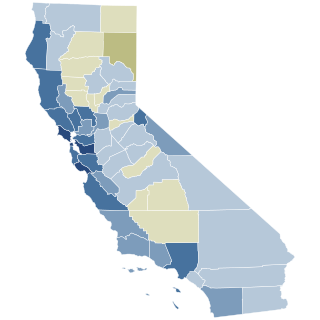
Proposition 1, titled Constitutional Right to Reproductive Freedom and initially known as Senate Constitutional Amendment 10 (SCA 10), was a California ballot proposition and state constitutional amendment that was voted on in the 2022 general election on November 8. Passing with more than two-thirds of the vote, the proposition amended the Constitution of California to explicitly grant the right to an abortion and contraceptives, making California among the first states in the nation to codify the right. The decision to propose the codification of abortion rights in the state constitution was precipitated in May 2022 by Politico's publishing of a leaked draft opinion showing the United States Supreme Court overturning Roe v. Wade and Planned Parenthood v. Casey in Dobbs v. Jackson Women's Health Organization. The decision reversed judicial precedent that previously held that the United States Constitution protected the right to an abortion.